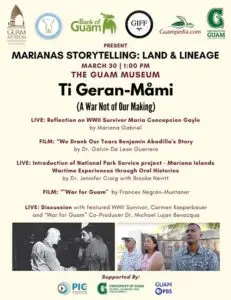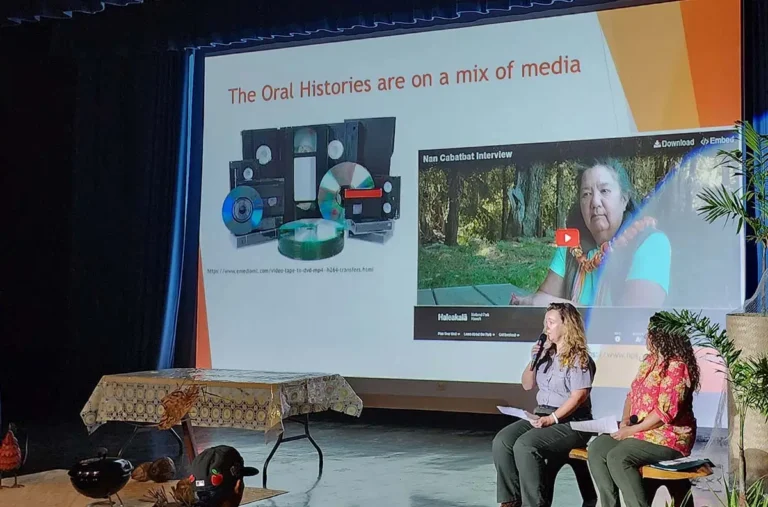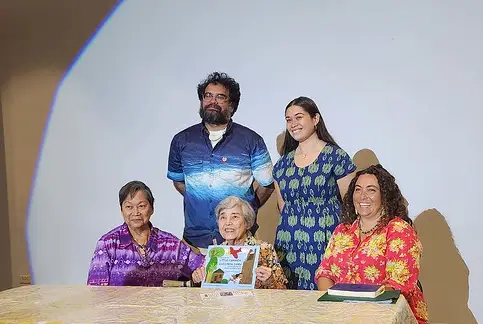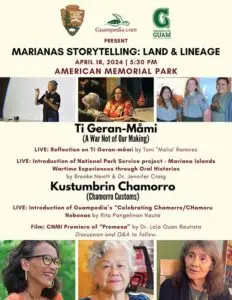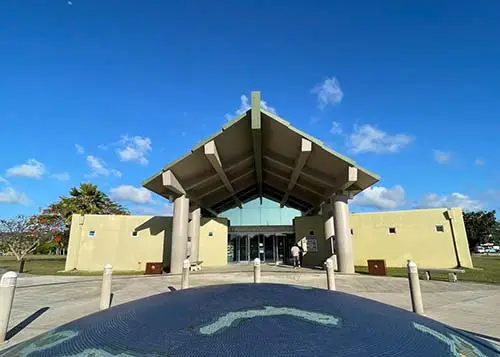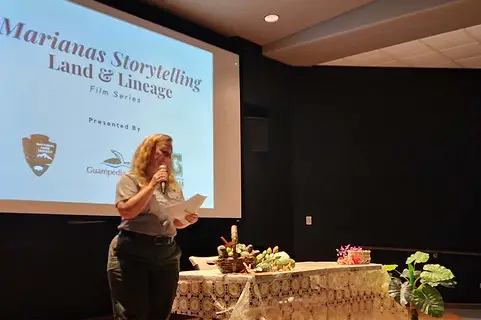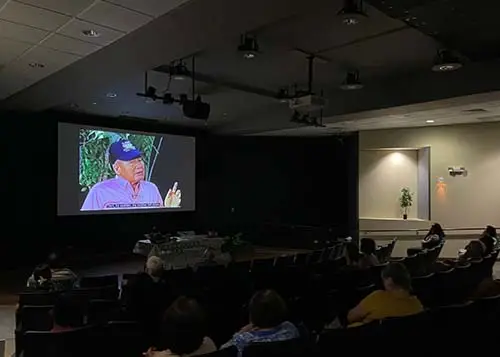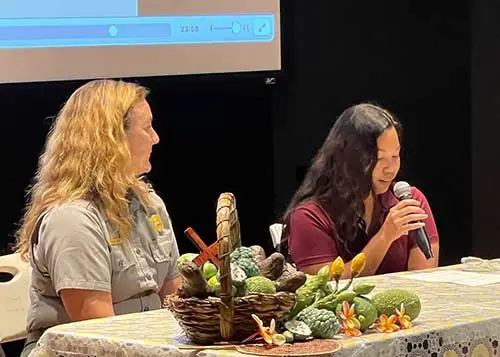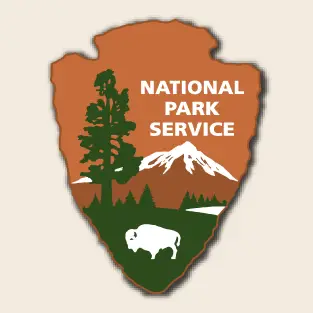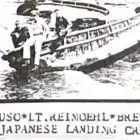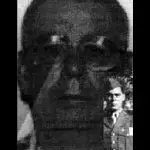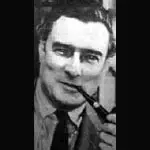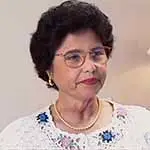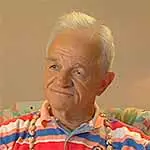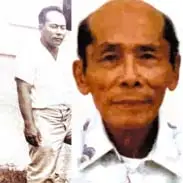Learn How to Use this Webpage here.
Welcome to the Marianas Wartime Oral Histories Portal
Table of Contents
Share This
This webpage serves as a community gateway to explore firsthand accounts of World War II in the Mariana Islands. Clicking on the images above or cards below leads you to the National Park Service gallery video and audio oral history pages, where you can play, download, and get the transcripts. This builds upon our earlier projects such as Fanhasso: War for Guam, the Pacific World War II Timeline, and Guampedia’s extensive entries on WWII. Please know that the project partners recognize the need to add Japanese WWII oral histories and several more NPS oral histories. We hope to continue this work and are seeking funding.
Led by Dr. Jennifer Craig through the Mariana Islands Wartime Experiences through Oral Histories Fellowship, this initiative continues the legacy of Toni “Malia” Ramirez’s Voices of Our Elders. It places community-led storytelling at the heart of understanding and sharing the true history of the Pacific Theater during World War II. The stories offer personal perspectives on survival, resilience, and remembrance, preserving a vital part of our shared history.
These oral histories were recorded by National Park Service staff during commemoration events held throughout the 1980s, 1990s, and early 2000s. From the National Park Service perspective, Dr. Craig’s fellowship has provided the opportunity to do work that is long overdue, that the parks previously did not have the capacity to address adequately.
“Through the work of Dr. Jennifer Craig, we have been able to better understand the wealth of resources we have and can now begin the process of finding appropriate and thoughtful ways to make them accessible to the communities they came from and beyond. Through the fellowship, we have been able to develop an inclusive approach to making accessible oral histories that have been sitting for nearly 40 years. The Fellow has worked with NPS, partners, and families to ensure this is done in a culturally sensitive and appropriate manner throughout the layers and partnerships. Critical to this has been empathy for the stories, those sharing the stories, the people working with these traumatic war memories and our communities,” the National Park Service stated.
Dr. Craig is a maritime archaeologist whose work centers on community-oriented, Indigenous, feminist archaeology. Her work expands collections-based research with heart-centered archaeology. With associates (both living and haunting), Dr. Craig answers scholarly questions by excavating archaeological collections found deep in repositories. Repositories are generated over decades by academic institutions, government agencies, museums, volunteer organizations, and cultural resource management firms.
For the Mariana Islands Wartime Experiences through Oral Histories Fellowship, Dr. Jennifer Craig worked with partners at Guampedia who recognize the coexistence of spirit and living to conduct a reciprocal process of curation on content for public consumption and embrace fatoigue taotaomo’ma (places and people visited by ancestral spirits). The fellowship aims to connect ancestors with descendants by engaging in inåfa’maolek para mo’na mañatatti (restoring harmony/balance moving forward or for future generations). Specifically, the project connects ancestor to descendant by sharing oral histories, some long forgotten, from the National Park Service collection. The project fulfills these goals by digitizing the videos and audio and creating this portal to make them accessible to the community.
The project’s progress was shared in regular community gatherings in the Marianas Storytelling series. As many of our World War II survivors have passed on and the influx of military installations increases, our events served as both a tribute and a call to action. Through partnerships like these and the voices of our storytellers, their legacy will continue to guide us forward.
Marianas Storytelling Series Premiere - Guam
On 30 March 2024, the Guam Museum hosted Marianas Storytelling: Land & Lineage – Ti Geran-Måmi (A War Not of Our Making), a special program honoring the lived experiences of CHamoru/Chamorro people during World War II. The event invited the community to reflect on personal and collective memories of wartime through a powerful blend of live storytelling, short films, and discussion.
The program opened with a moving reflection by WWII survivor Maria Concepcion Gayle, who shared her story of survival and resilience. Her words set a heartfelt tone for the evening and served as a reminder of the strength and courage carried by so many during the war. The audience then viewed the short film “We Break Our Tears: Benjamin Abadilla’s Story” by Dr. Olivia De Leon Guerrero, which explored the emotional impact of war through the personal experience of another survivor.
A highlight of the evening was the introduction of the Mariana Islands Wartime Experiences through Oral Histories Fellowship, presented by Dr. Jennifer Craig and National Park Service’s Ranger Brooke Nevitt. Dr. Craig introduced herself and her methods, sharing the project’s resources and directly asking how the Pacific Islander audience would like to receive the stories.
The program also featured the short film “War for Guam” by Frances Negrón-Muntaner, offering additional perspective on the cultural and political aftermath of WWII in the islands. The evening concluded with a thoughtful discussion between WWII survivor Carmen Lekka Babauta, filmmaker Frances Negrón-Muntaner, and Michael Lujan Bevacqua, who provided historical context and commentary. Together, they explored themes of memory, legacy, and healing across generations.
Marianas Storytelling Series Premiere - Saipan
At American Memorial Park on 18 April 2024, Marianas Storytelling: Land & Lineage themed “Ti Geran-Måmi (A War Not of Our Making),“ invited the public to gather for an evening of heart-centered storytelling focused on the lasting connections between land, family, and memory in the Mariana Islands.
Attendees heard deeply personal stories of strength, resilience, and renewal, reminding us of a generation that endured great hardship yet rebuilt their lives through faith, community, and the enduring spirit of inafamaolek.
The event featured a reflection by Toni “Malia” Ramirez of Ti Geran-måmi, which captured the emotional truth of war from the perspective of the islands’ people.
A highlight of the evening was the introduction of the Mariana Islands Wartime Experiences through Oral Histories Fellowship, presented by Dr. Jennifer Craig and National Park Service’s Ranger Brooke Nevitt. Dr. Craig introduced herself and her methods, sharing the project’s resources and directly asking how the Pacific Islander audience would like to receive the stories.
This was accompanied by the launch of Guampedia’s newest section, “Celebrating Chamorro/CHamoru Nobenas,” an initiative honoring spiritual and cultural continuity across generations.
The evening concluded with a screening of the moving documentary “Promesa” by Dr. Lola Quan Bautista, produced in partnership with the Pacific Islanders in Communications and the CNMI Museum. The film explores CHamoru/Chamorro prayer traditions and the enduring power of faith and family in sustaining cultural identity.
Mid Project Progress
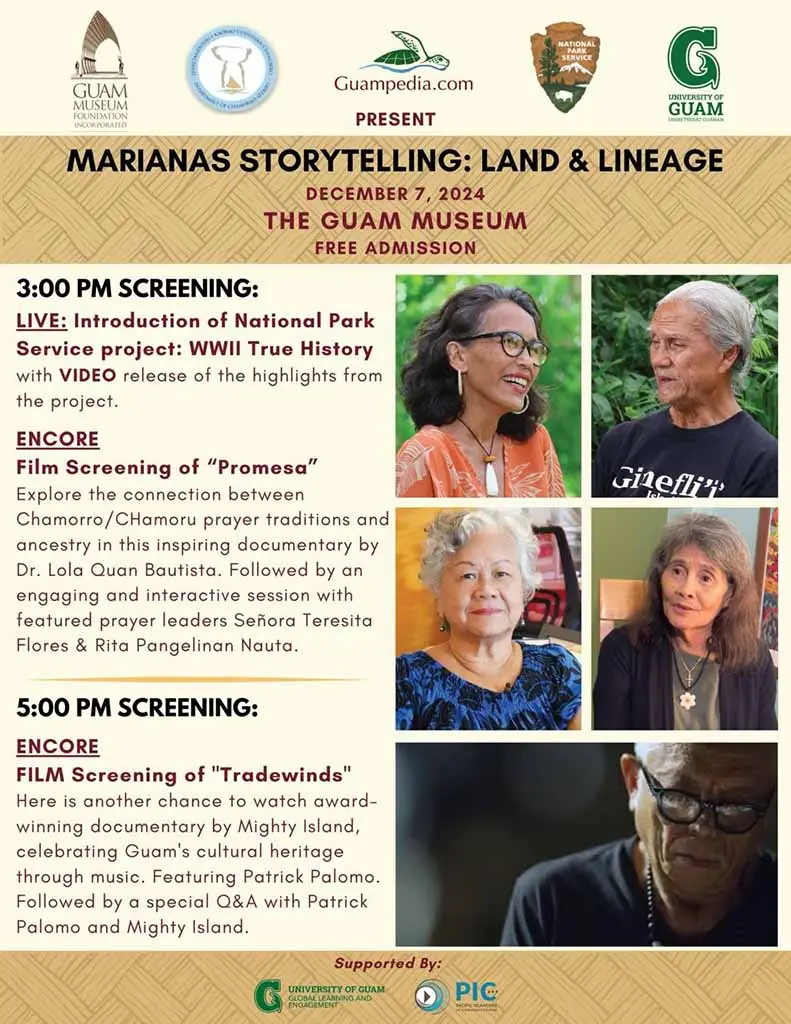
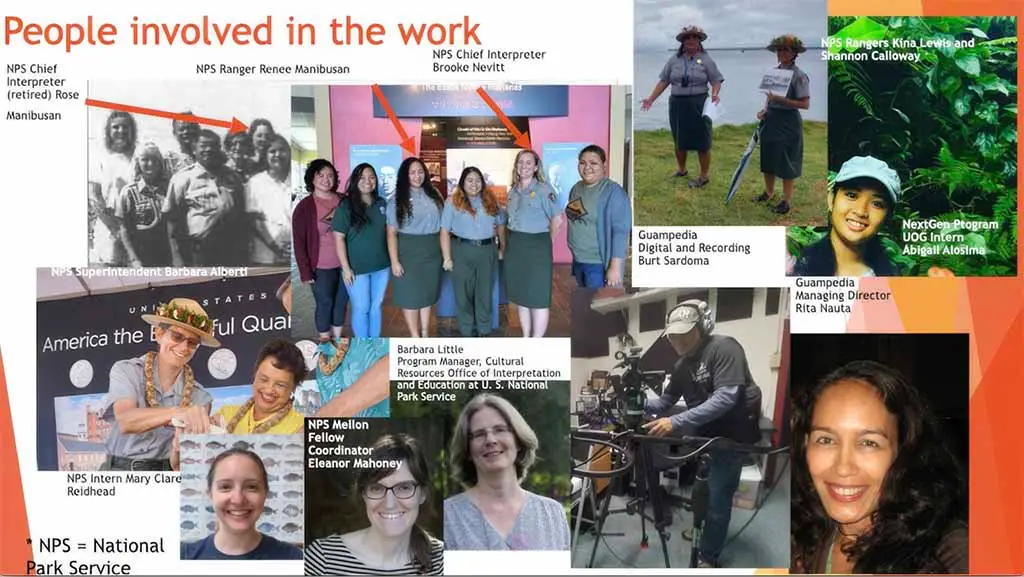
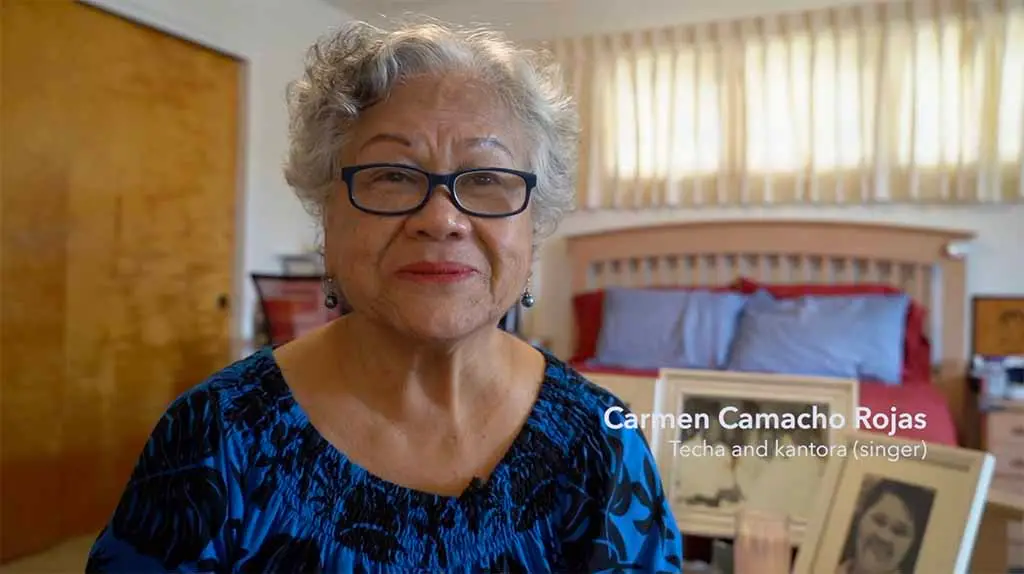
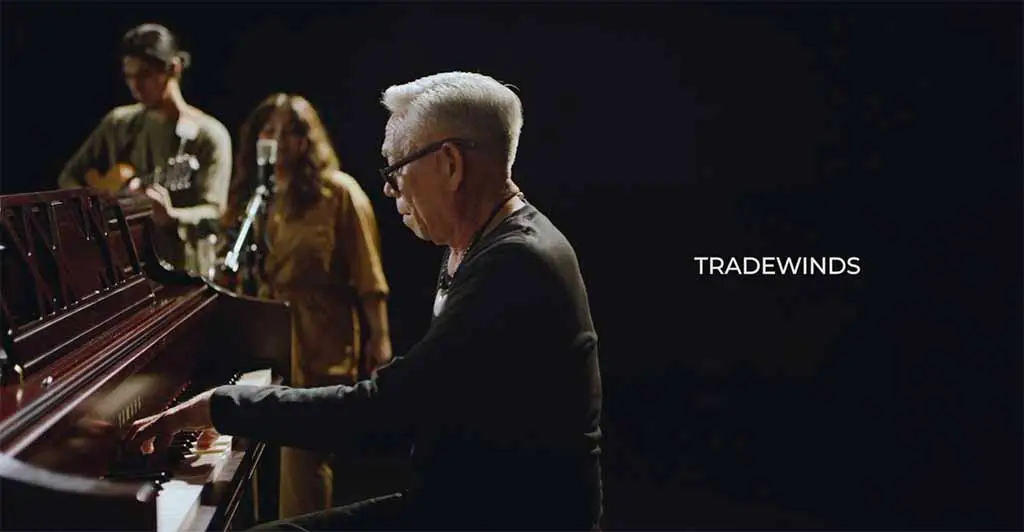
On 7 December 2024, the Guam Museum welcomed the community to a meaningful afternoon of storytelling, history, and culture as part of the Marianas Storytelling: Land & Lineage series. This special event invited guests to reflect on the connections between heritage, memory, and identity through powerful films and heartfelt conversations.
The program opened with a live introduction to the National Park Service’s WWII True History project, a public education component of the Mariana Islands Wartime Experiences through Oral Histories Fellowship, which shared highlights from efforts to preserve and share the real experiences of CHamorus during World War II. It was a chance to listen to history through voices that have long deserved to be heard from interviews collected in the 1980s, 1990s, and early 2000s.
Attendees also had the opportunity to revisit Promesa, a touching documentary by Dr. Lola Quan Bautista that explores CHamoru prayer traditions and the enduring connection to ancestry. Following the screening, prayer leaders Señora Teresita Flores and Rita Pangelinan Nauta led an engaging conversation about faith, family, and the power of remembering where we come from.
Later, the audience enjoyed an encore presentation of Tradewinds, an award-winning documentary by Mighty Island that celebrates Guam’s cultural heritage through music. Featuring the beloved musician Patrick Palomo, the film struck a powerful chord with many, and a post-screening Q&A with Palomo and the Mighty Island team offered personal insights into the role of music in shaping identity and preserving tradition.
Presented by Guampedia, the Guam Museum Foundation, the National Park Service, the Northern Marianas Humanities Council, and the University of Guam—with support from the University of Guam Global Learning and Engagement and Pacific Islanders in Communications—this event served as a moving reminder of how storytelling continues to bring generations together and keep our island’s history alive.
WWII's Living History & Legacy
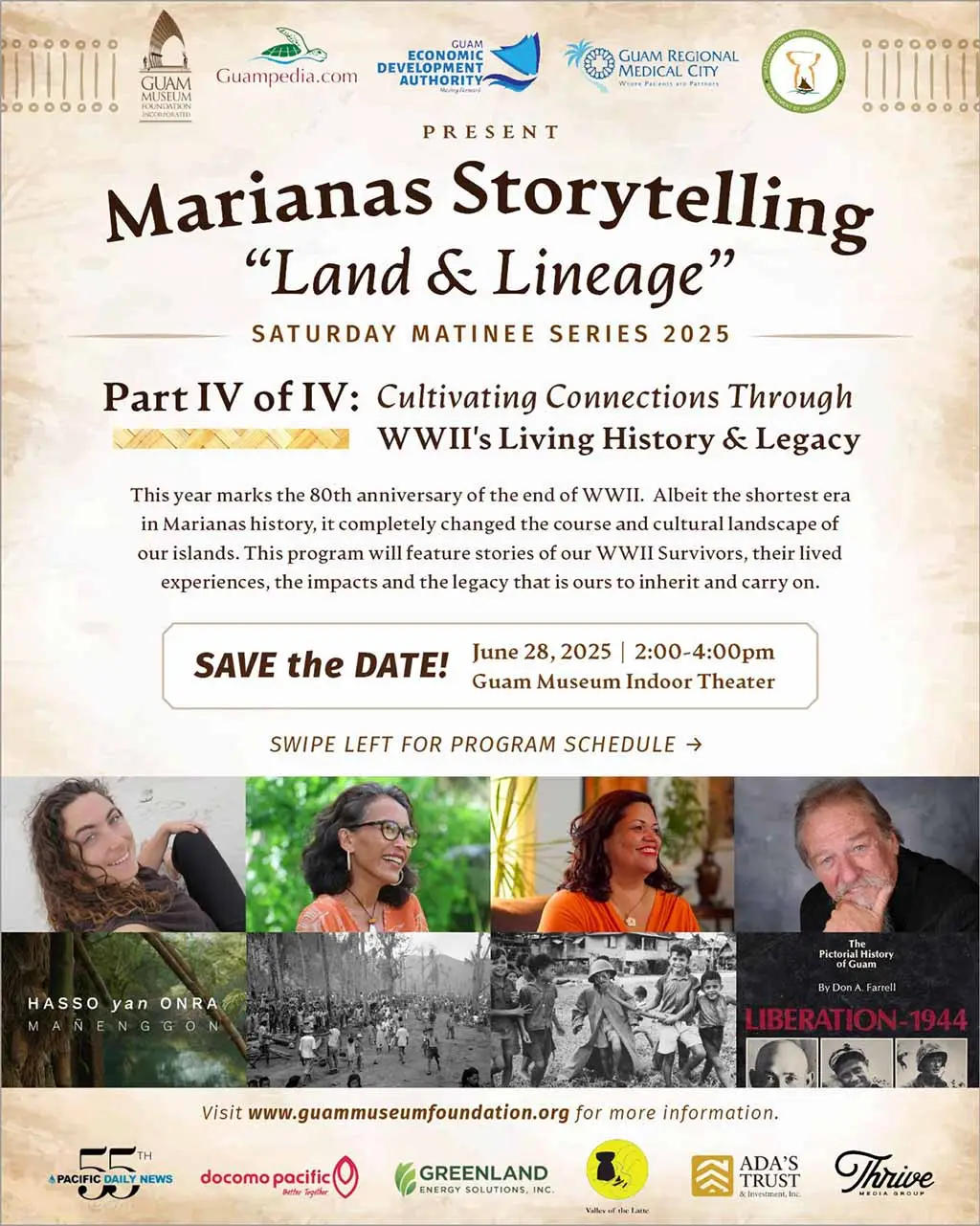
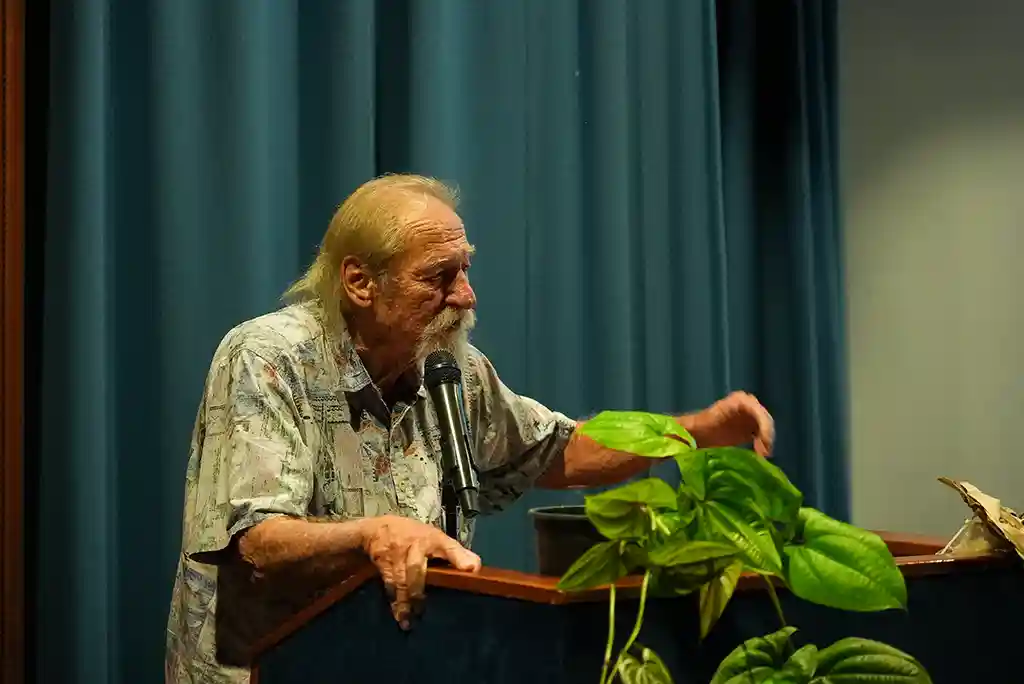
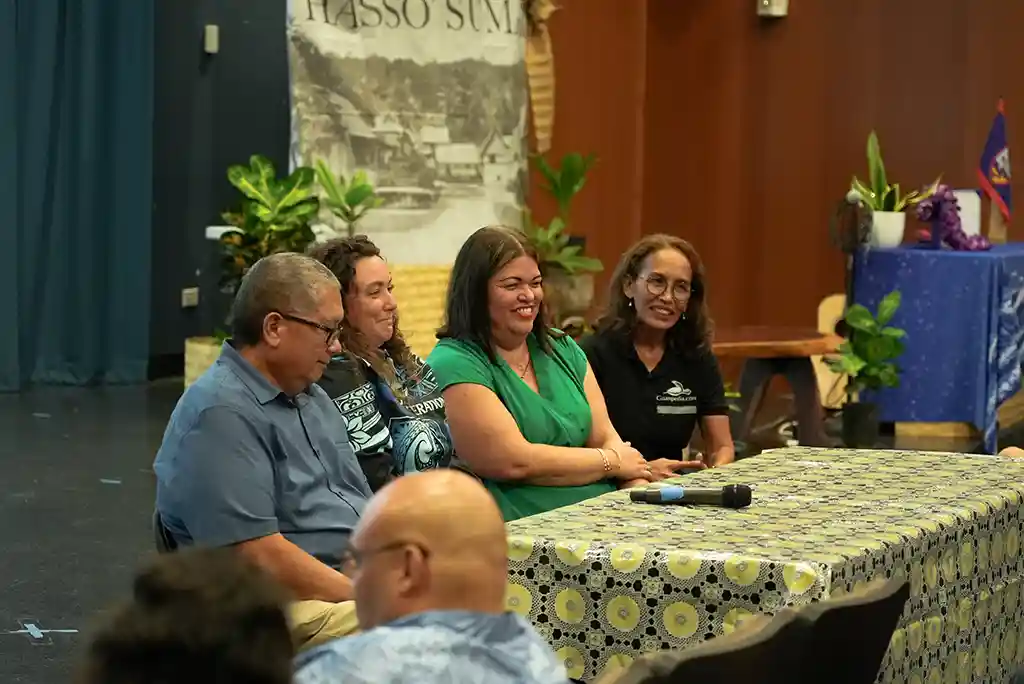
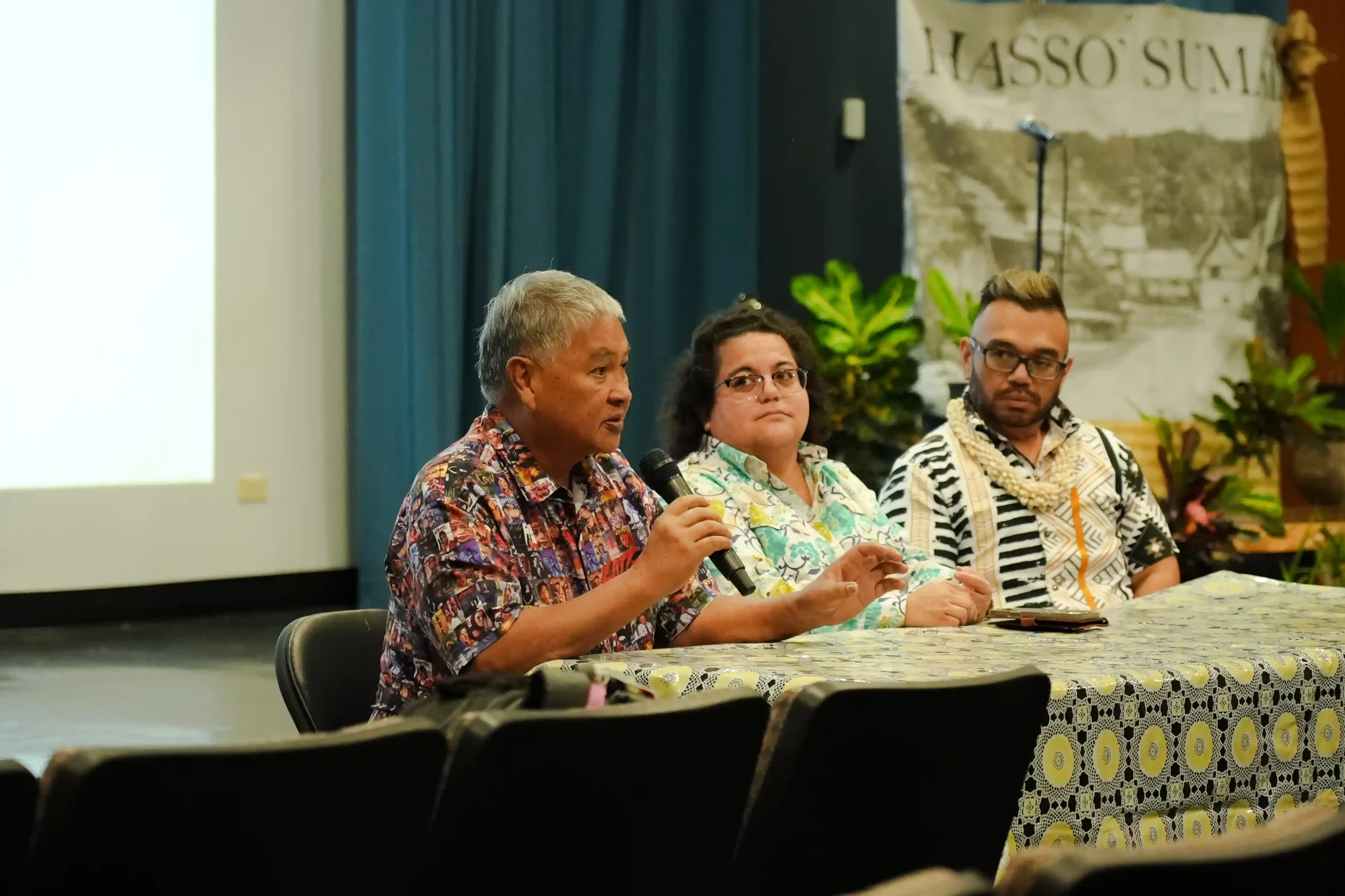
Cultivating Ancestral Connections Through Storytelling
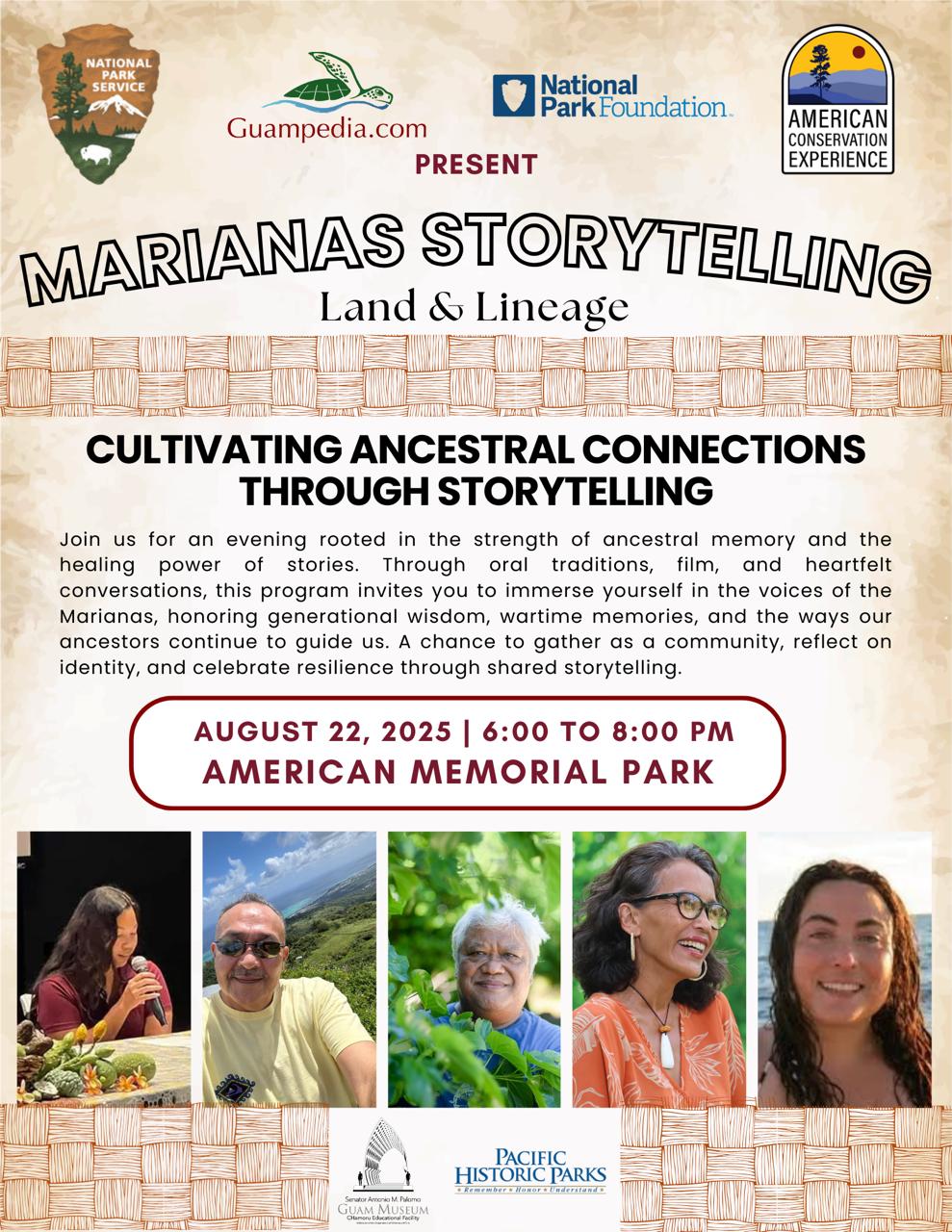
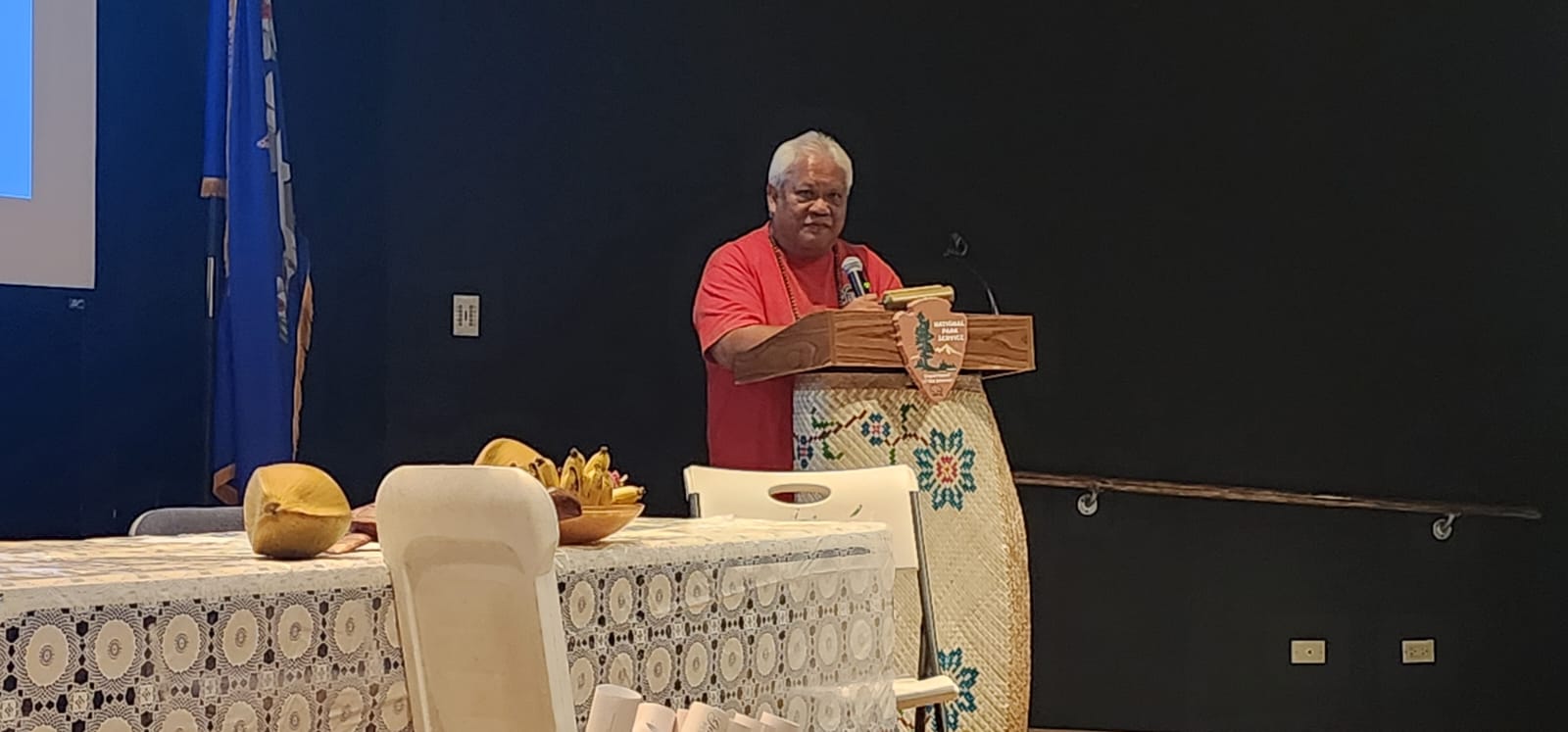
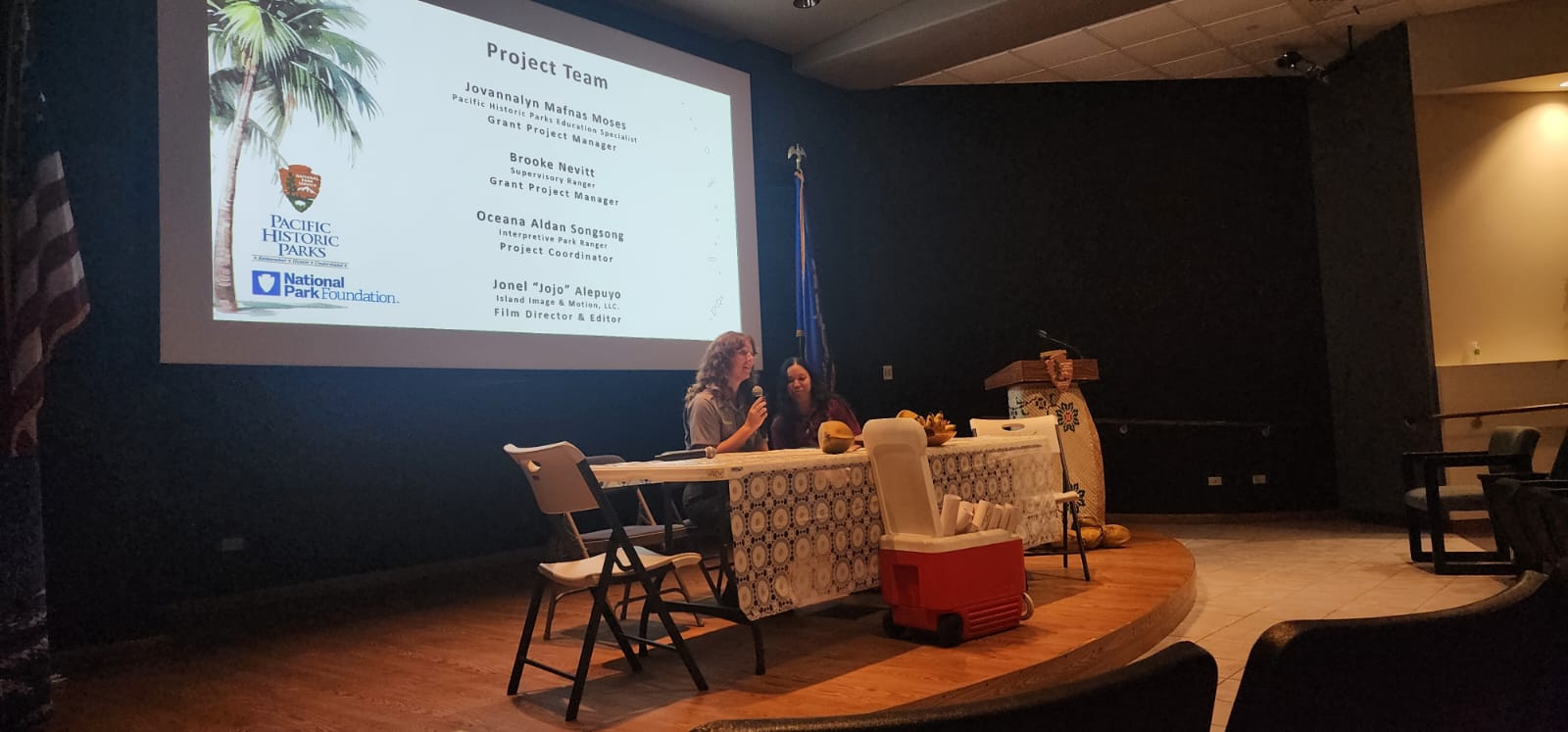
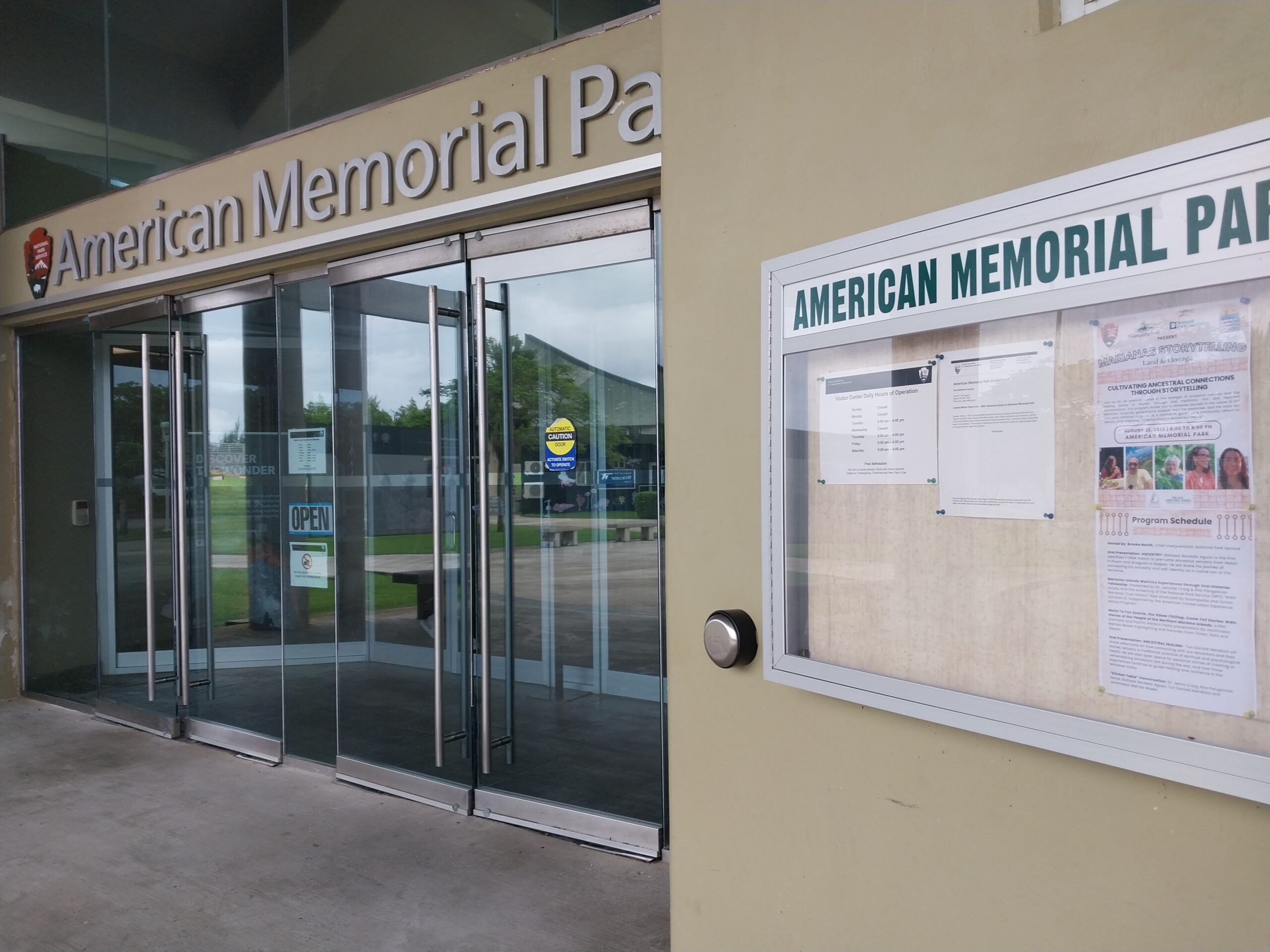
22 August 2025, the Cultivating Ancestral Connections through Storytelling evening was rooted in the strength of ancestral memory and the healing power of stories. Through oral traditions, film, and heartfelt conversations, Marianas Storytelling: Land & Lineage invited the community to immerse themselves in the voices of the Marianas. The program honored generational wisdom, wartime memories, and the ways ancestors continue to guide us. It was a chance to gather, reflect on identity, and celebrate resilience through shared storytelling.
The program opened with host Brooke Nevitt, Chief of Interpretation at the National Park Service, guiding the evening. Baltazar Bordallo Aguon shared his journey of ancestry as the first identified Y-DNA match to pre-Latte ancestral remains from Guam and Saipan, offering a powerful reflection on identity and connection. Dr. Jennifer Craig and Rita Pangelinan Nauta followed with highlights from the Marianas Islands Wartime Experiences through Oral Histories Fellowship, including a screening of the National Park Service’s WWII Marianas True History reel produced by Guampedia and Simon Sanchez III. Jovannalyn Mafnas Moses of Pacific Historic Parks premiered Maila’Ta Fan Estoria, Itto Sibwe Tittilap, Come Tell Stories: WWII Stories of the People of the Northern Mariana Islands, showcasing oral histories from Tinian, Rota, and Saipan. The evening continued with reflections on ancestral healing by Tun Donald Mendiola, who spoke about the ways connecting with ancestors provides spiritual and psychological strength, as well as guidance for healing in the Marianas today. To close the night, all presenters gathered for a “Kitchen Table” conversation, offering space for dialogue, shared memory, and community connection.Audio only interviews
Clicking on the cards below leads you to the NPgallery audio oral history pages, where you can play, download, and get the transcripts.
Documents
Psychological Safety
Learn the theory and practice of Oral History
Each workshop will introduce a key theme in oral history theory and practice. Reminders to watch the videos and read supporting material will be sent weekly.
How do we get visitors to connect emotionally to the sacrifice our parks memorialize?
We aim to build a multi-tiered SOP of Oral History with Story; Storyteller; Visitor AMME/WAPA staff weave together these three tiers into a park specific SOP of Oral History.
NPS Staff and Intern Resources for Mental Health and Wellbeing
Our wellness matters, and acknowledging when our stress level is high, and utilizing effective techniques, strategies, and practices cope can be important for our own wellness.

